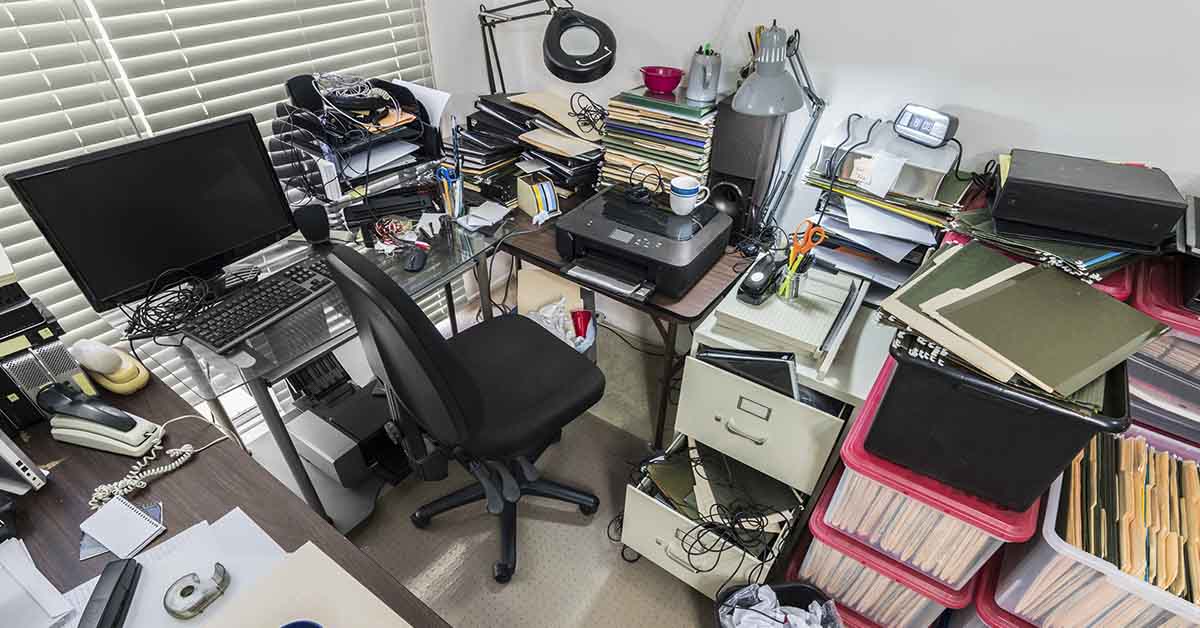In a world where we are constantly being told we need more stuff, it’s so easy to become ‘consumed’ with the act of consumption and end up with clutter in our world. Consider the last thing you bought. Was it absolutely necessary, or did you convince yourself it was vital to your daily living? So often, it’s the latter, and these frivolous items end up occupying space in your house before collecting dust and eventually occupying space inside of a landfill. Find out what you should throw out and why it’s important that you do!
Decluttering to improve your attention
Psychologist Sherrie Bourg Carter says: “Clutter can play a significant role in how we feel about our homes, our workplaces, and ourselves. Messy homes and workspaces leave us feeling anxious, helpless, and overwhelmed. Yet, rarely is clutter recognized as a significant source of stress in our lives.”
In a study performed by researchers from Princeton University, people in an environment filled with stuff were far less capable of prolonged focus than those in an organized, serene environment. This was because hyper-stimulation of the visual cortex contributed to preventing the brain from efficiently processing information, leading to delayed attention and response time to the task at hand.
So for those of you who have noticed that you feel a lot more frazzled when things aren’t in order around the house, it’s not just you. It’s psychology.
Decluttering as a form of stress-relief
A messy space is not only harsh on the eyes, but also tough on the mind. In a unique study conducted by researchers at UCLA’s Center on Everyday Lives and Families (CELF), the relationship between 32 Californian middle-class families and the objects in their homes was examined over the course of four years. Researchers found that one of the most critical problems across households indicating enhanced stress was the high volume and poor management of physical possessions: cluttered rooms, specifically, elevated levels of stress hormones in mothers.
Less Clutter: Minimalism as unfiltered joy
Minimalism is a lifestyle practice that channels the idea of ‘less is more.’ Minimalists restrict themselves to only a limited number of things that bring them honest pleasure and discard everything else in their life! In doing so, they are freed from a sense of attachment to material possessions and are able derive joy from the grander aspects of life, such as shared moments between loved ones and the splendor of nature.
Read: There Is A Scientific Link Between Depression And Clutter
How to Declutter Your Home to Declutter Your Life
Here is a list of potential items you can probably get rid of in your house. While it looks daunting, the mental and social benefits of decluttering are totally worth the short-lived separation anxiety you might experience from throwing away all the things you don’t need!
Your bathroom:
- Old toiletries (bottles and gels lying around…that are likely expired!)
- Dried-up nail polish (face it…there’s no use here)
- Worn-out bath mats (not to mention these fabrics probably contain a lot of dirty germs)
- Old air freshener (be sure to correctly dispose of aerosol cans)
- Old makeup (do you have five bottles of dried-up mascara in your make-up bag as well? Let’s throw them out!)
Your living room:
- Newspapers (if you didn’t read it the day it was delivered, you’re probably not going to read it ever)
- DVDs (truthfully, when was the last time you popped in a DVD to watch?)
- Toys your kids don’t play with (donate the toys your growing kids don’t use)
- Old unused batteries (this item collects in a lot of households, be sure to dispose of them properly)
- Furniture manual (if your table is already assembled, you don’t need the manual)
Your bedroom and wardrobe:
- Worn-out sheets and bedding (no one is building a pillow fort)
- Scarves and other accessories (general rule of thumb: if you haven’t worn it in the past year, toss it!)
- Old, unused hangers (there’s no point hanging onto this)
- Old dresses (unless of course, they hold sentimental value)
- Stockings with runs (nothing could save this pair of stockings…let them go!)
Your kitchen:
- Duplicate cooking utensils (you don’t need two cheese graters)
- Extra and unused coffee mugs (truthfully, everyone only needs one mug)
- Old spices (There’s at least one spice container that has taken permanent residence on the shelf)
- Old shopping bags (The standard bag full of bags many of us know, really should not contain over 5 bags)
- Magnets (Face it, not all of those magnets have sentimental value)
This article originally appeared on The Hearty Soul and has been republished here with permission.
Keep Reading: Studies Show Anxiety Disorders May Be Caused By Exposure To Narcissistic Abuse

